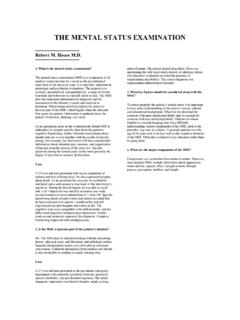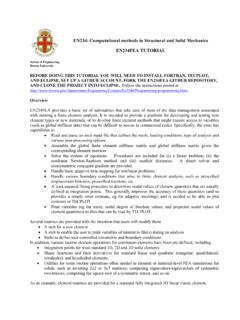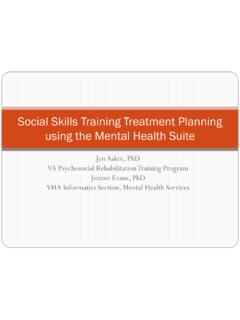Transcription of THE INITIAL PSYCHIATRIC INTERVIEW - Brown University
1 THE INITIAL PSYCHIATRIC INTERVIEW . Robert Waldinger Alan M. Jacobson 1. What are the primary aims of the first PSYCHIATRIC with a concerned listener can be enormously relieving in and INTERVIEW ? of itself. Thus, the INITIAL INTERVIEW is the start of treatment even before a formal treatment plan has been established. To make an INITIAL differential diagnosis and to formulate a treatment plan. These goals are achieved by: 3. How should the INITIAL INTERVIEW be organized? Gathering information There is no single ideal, but it is useful to think of the INITIAL INTERVIEW as having three components: Chief complaint History of current and past suicidal and homicidal Establish INITIAL rapport with the patient, and ask about the ideation presenting complaint or problems, , what has brought the History of presenting Current and past history of patient to the first meeting.
2 Some patients tell their stories problem(s) victimization ( , domestic without much guidance from the interviewer, whereas others violence, child abuse) require explicit instructions in the form of specific questions to help them organize their thoughts. During this phase of the Precipitating factors History of PSYCHIATRIC first INTERVIEW , the patient should be allowed to follow his or problems, including her own thought patterns as much as possible. treatment and response Symptoms Social and developmental Elicit specific information, including a history of the history presenting problems, pertinent medical information, family background, social history, and specific symptom and Affective Family PSYCHIATRIC and social behavioral patterns.
3 Formally test mental status (see that history Chapter). Cognitive Mental history Physical Medical history Ask if the patient has any questions or unmentioned concerns. INITIAL recommendations are then made to the Substance use and abuse patient for further evaluation and/or beginning treatment. Changes in role and social functioning Although the three parts of the INTERVIEW can be considered separately, they often weave together, , mental status observations can be made from the moment the clinician meets the patient. Pertinent medical and family history may be brought up in the course of presenting other concerns, and patients may pose important questions about treatment Arriving at an empathic understanding of how recommendations as they present their INITIAL history.
4 The patient feels. This understanding is a critical base for establishing rapport with the patient. When the clinician listens carefully and then 4. Is the INITIAL assessment different for complex communicates an appreciation of the patient's situations? worries and concerns, the patient gains a sense of being understood. This sense of being understood The INITIAL PSYCHIATRIC assessment may require more than one is the bedrock of all subsequent treatment, and session for complex situations for example, when allows the clinician to initiate a relationship in evaluating children or families, or when assessing a patient's which an alliance for treatment can be established.
5 Suitability for a particular therapeutic approach, such as brief psychotherapy. The INITIAL assessment also may require 2. That's a lot to focus on in the first meeting. What about information gathering from other sources: parents, children, helping the patient? spouse, best friend, teacher, police officers, and/or other healthcare providers. These contacts may be incorporated into the first visit, or may occur later. The first step in making The INITIAL diagnosis and treatment plan may be rudimentary. such arrangements is to explain the reason for them to the Indeed, when patients present in a crisis, the history may be patient and to obtain explicit, written permission for the confused, incomplete, or narrowly focused.
6 As a result, some contact. interventions are started even when basic information about history, family relationships, and ongoing stressors is being gathered. It is critical to remember that emotional difficulties often are isolating. The experience of sharing one's problem 2. 5. How should a referral source be approached? comfortable before embarking on a description of their problems. If the anxiety is evident, a simple comment about the anxiety may help patients to talk about their worries. It is almost always appropriate to call the referral source to gather information and to explain the INITIAL diagnostic impressions and treatment plans.
7 Exceptions may occur when 9. Is a highly structured format important? the referral comes from other patients, friends, or other nonprofessionals, whom the patient wishes to exclude from No. Patients must be given some opportunity to organize treatment. their information in the way that they feel most comfortable. The interviewer who prematurely subjects the patient to a 6. Are there any variations on these guidelines for an stream of specific questions limits information about the INITIAL assessment? patient's own thinking process, does not learn how the patient handles silences or sadness, and closes off the patient's opportunities to hint at or introduce new topics.
8 Specific theoretical orientations may dictate important Furthermore, the task of formulating one specific question variations in the INITIAL assessment. For example, a behavioral after another may intrude on the clinician's ability to listen therapist guides discussion to specific analyses of current and to understand the patient. problems and spends little time on early childhood experiences. The psychopharmacologic evaluation emphasizes specific symptom patterns, responses to prior This does not mean that specific questions should be avoided. medication treatment, and family history of PSYCHIATRIC Often, patients provide elaborate answers to specific illness.
9 The approach presented in this chapter is a broadly questions such as When were you married? Their applicable set of principles that can be used in evaluating responses may open new avenues to the inquiry. The key is most patients. to avoid a rapid-fire approach and to allow patients to elaborate their thoughts. 7. How is information gathered from an INTERVIEW ? 10. How should questions be asked? The interviewer must discover as much as possible about how the patient thinks and feels. During the clinical Questions should be phrased in a way that invites patients to INTERVIEW , information is gathered from what the patient tells talk.
10 Open-ended questions that do not indicate an answer the interviewer; critically important clues also come from tend to allow people to elaborate more than specific or how the history unfolds. Thus, both the content of the leading questions. In general, leading questions ( , Did INTERVIEW ( , what the patient says) and the process of the you feel sad when your girlfriend moved out? ) can be INTERVIEW ( , how the patient says it) offer important conversation stoppers, because they may give the impression routes to understanding the patient's problems. Consider the that the interviewer expects the patient to have certain order of information, the degree of comfort in talking about feelings.



















